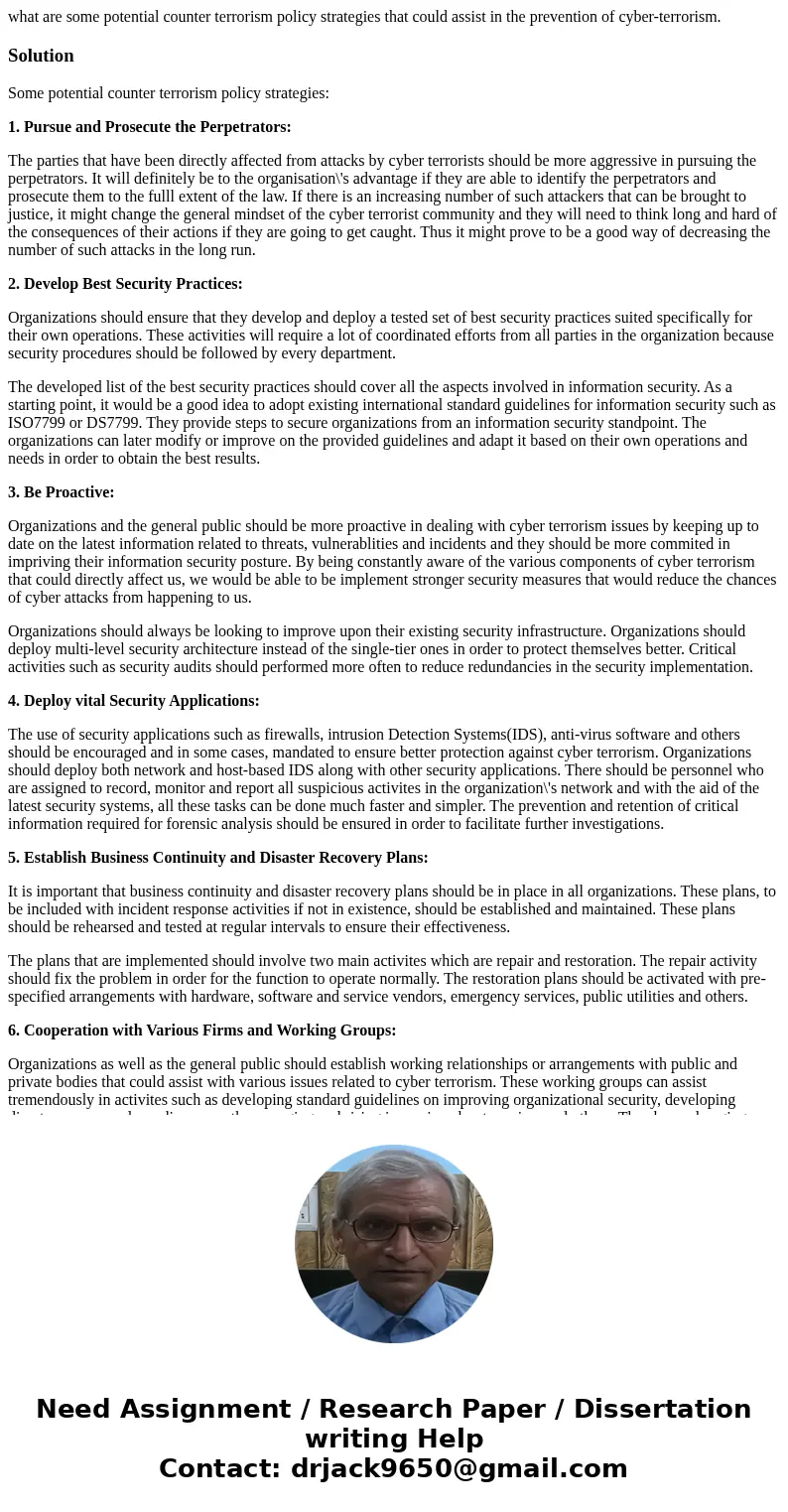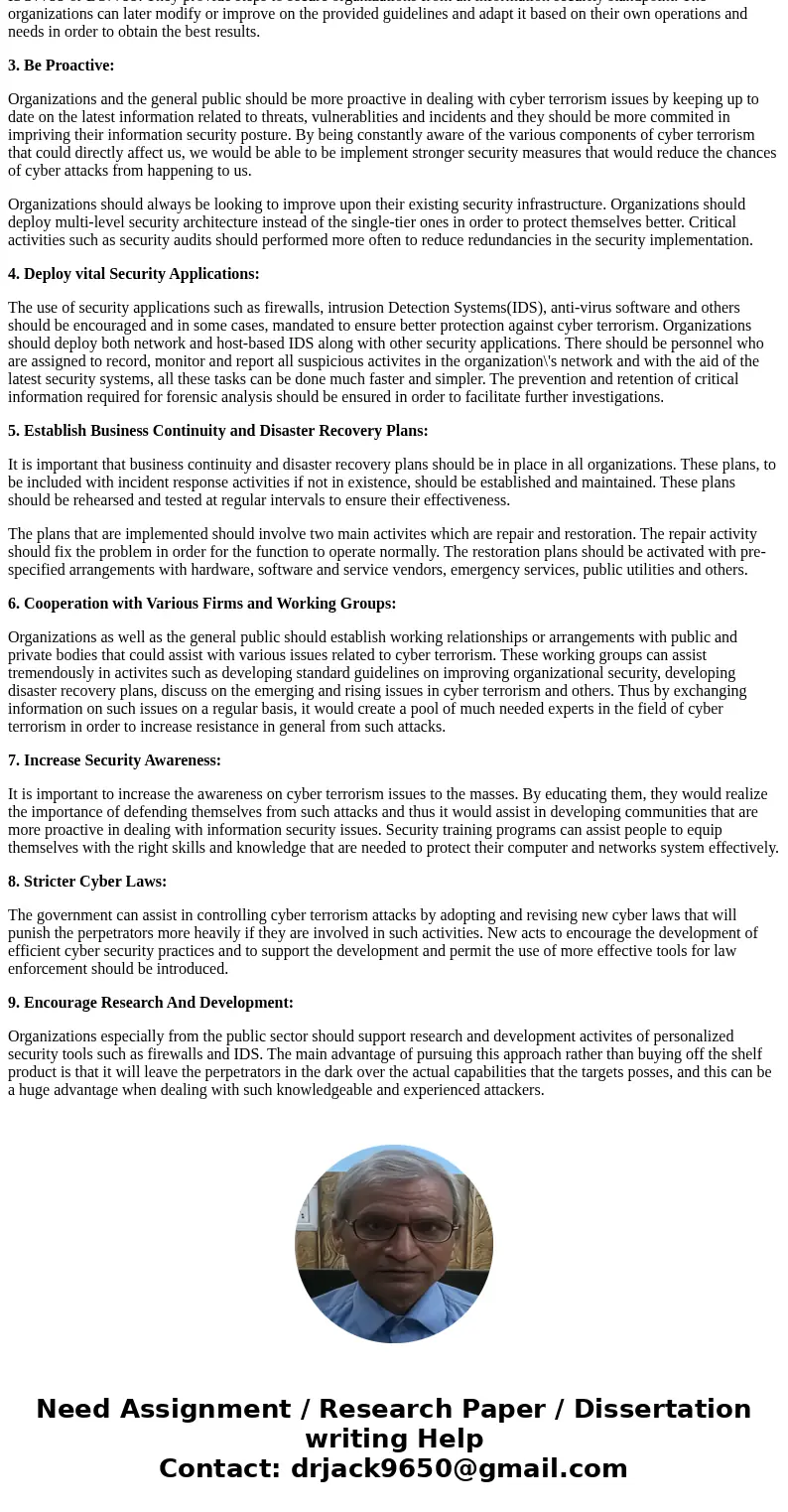what are some potential counter terrorism policy strategies
what are some potential counter terrorism policy strategies that could assist in the prevention of cyber-terrorism.
Solution
Some potential counter terrorism policy strategies:
1. Pursue and Prosecute the Perpetrators:
The parties that have been directly affected from attacks by cyber terrorists should be more aggressive in pursuing the perpetrators. It will definitely be to the organisation\'s advantage if they are able to identify the perpetrators and prosecute them to the fulll extent of the law. If there is an increasing number of such attackers that can be brought to justice, it might change the general mindset of the cyber terrorist community and they will need to think long and hard of the consequences of their actions if they are going to get caught. Thus it might prove to be a good way of decreasing the number of such attacks in the long run.
2. Develop Best Security Practices:
Organizations should ensure that they develop and deploy a tested set of best security practices suited specifically for their own operations. These activities will require a lot of coordinated efforts from all parties in the organization because security procedures should be followed by every department.
The developed list of the best security practices should cover all the aspects involved in information security. As a starting point, it would be a good idea to adopt existing international standard guidelines for information security such as ISO7799 or DS7799. They provide steps to secure organizations from an information security standpoint. The organizations can later modify or improve on the provided guidelines and adapt it based on their own operations and needs in order to obtain the best results.
3. Be Proactive:
Organizations and the general public should be more proactive in dealing with cyber terrorism issues by keeping up to date on the latest information related to threats, vulnerablities and incidents and they should be more commited in impriving their information security posture. By being constantly aware of the various components of cyber terrorism that could directly affect us, we would be able to be implement stronger security measures that would reduce the chances of cyber attacks from happening to us.
Organizations should always be looking to improve upon their existing security infrastructure. Organizations should deploy multi-level security architecture instead of the single-tier ones in order to protect themselves better. Critical activities such as security audits should performed more often to reduce redundancies in the security implementation.
4. Deploy vital Security Applications:
The use of security applications such as firewalls, intrusion Detection Systems(IDS), anti-virus software and others should be encouraged and in some cases, mandated to ensure better protection against cyber terrorism. Organizations should deploy both network and host-based IDS along with other security applications. There should be personnel who are assigned to record, monitor and report all suspicious activites in the organization\'s network and with the aid of the latest security systems, all these tasks can be done much faster and simpler. The prevention and retention of critical information required for forensic analysis should be ensured in order to facilitate further investigations.
5. Establish Business Continuity and Disaster Recovery Plans:
It is important that business continuity and disaster recovery plans should be in place in all organizations. These plans, to be included with incident response activities if not in existence, should be established and maintained. These plans should be rehearsed and tested at regular intervals to ensure their effectiveness.
The plans that are implemented should involve two main activites which are repair and restoration. The repair activity should fix the problem in order for the function to operate normally. The restoration plans should be activated with pre-specified arrangements with hardware, software and service vendors, emergency services, public utilities and others.
6. Cooperation with Various Firms and Working Groups:
Organizations as well as the general public should establish working relationships or arrangements with public and private bodies that could assist with various issues related to cyber terrorism. These working groups can assist tremendously in activites such as developing standard guidelines on improving organizational security, developing disaster recovery plans, discuss on the emerging and rising issues in cyber terrorism and others. Thus by exchanging information on such issues on a regular basis, it would create a pool of much needed experts in the field of cyber terrorism in order to increase resistance in general from such attacks.
7. Increase Security Awareness:
It is important to increase the awareness on cyber terrorism issues to the masses. By educating them, they would realize the importance of defending themselves from such attacks and thus it would assist in developing communities that are more proactive in dealing with information security issues. Security training programs can assist people to equip themselves with the right skills and knowledge that are needed to protect their computer and networks system effectively.
8. Stricter Cyber Laws:
The government can assist in controlling cyber terrorism attacks by adopting and revising new cyber laws that will punish the perpetrators more heavily if they are involved in such activities. New acts to encourage the development of efficient cyber security practices and to support the development and permit the use of more effective tools for law enforcement should be introduced.
9. Encourage Research And Development:
Organizations especially from the public sector should support research and development activites of personalized security tools such as firewalls and IDS. The main advantage of pursuing this approach rather than buying off the shelf product is that it will leave the perpetrators in the dark over the actual capabilities that the targets posses, and this can be a huge advantage when dealing with such knowledgeable and experienced attackers.


 Homework Sourse
Homework Sourse